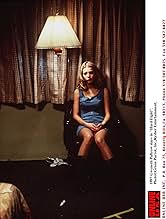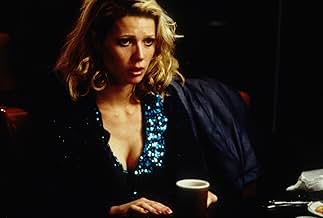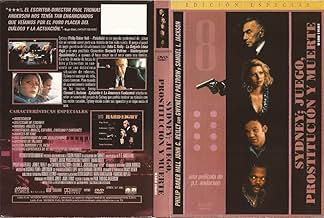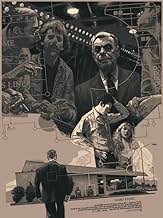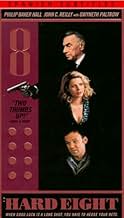Le joueur professionnel Sydney enseigne à John les ficelles du métier. John se débrouille bien jusqu'à ce qu'il tombe amoureux de la serveuse Clémentine.Le joueur professionnel Sydney enseigne à John les ficelles du métier. John se débrouille bien jusqu'à ce qu'il tombe amoureux de la serveuse Clémentine.Le joueur professionnel Sydney enseigne à John les ficelles du métier. John se débrouille bien jusqu'à ce qu'il tombe amoureux de la serveuse Clémentine.
- Réalisation
- Scénario
- Casting principal
- Récompenses
- 2 victoires et 8 nominations au total
Philip Seymour Hoffman
- Young Craps Player
- (as Phillip Seymour Hoffman)
Avis à la une
Hard Eight (1996/Paul Thomas Anderson) ***1/2 out of ****
The camera opens to a diner called "Jack's Coffee Shop". A semi is pulling out of the parking lot. After it pulls away, two people are revealed. A young man sitting by the door with his face to the ground, and an older man who is walking towards him. Even though we can't see his face, we know he is old, just by the way he moves. He asks the young man if he would like some coffee and cigarettes. And this is how Paul Thomas Anderson's first film begins.
"Hard Eight" is about a down and out loser named John (John C. Reilly), who sits outside a diner, until he is encountered by a mysterious old man named Sydney (Philip Baker Hall). Sydney offers him $50, and a lesson in gambling. Before to long, they are in Reno, making lots of money. Then two people get in the way of their friendship: Clementine (Gwyneth Paltrow), a hooker/waitress; and Jimmy (Samuel L. Jackson), a mischievous security guard who seems to be hiding something.
I never thought that Paul Thomas Anderson could make such a grounded film with substance. His usual films are flashy ensembles, and they move fast. But "Hard Eight" is a different story. It is a slow paced Film Noir, that is both quiet and observant. The cinematography is drab, and the direction is tranquil. Philip Baker Hall and Paltrow turn in good performances. But it is Jackson who really shines. The twist could have been over done, but instead, it is handled nicely and effectively.
"Hard Eight" is by far one of the most interesting character studies of the 90's. I like this cool side of Anderson, and I wish he would use it more often than his usual over the top formula (although I like both). This is no classic, but I found it worth buying.
-30-
The camera opens to a diner called "Jack's Coffee Shop". A semi is pulling out of the parking lot. After it pulls away, two people are revealed. A young man sitting by the door with his face to the ground, and an older man who is walking towards him. Even though we can't see his face, we know he is old, just by the way he moves. He asks the young man if he would like some coffee and cigarettes. And this is how Paul Thomas Anderson's first film begins.
"Hard Eight" is about a down and out loser named John (John C. Reilly), who sits outside a diner, until he is encountered by a mysterious old man named Sydney (Philip Baker Hall). Sydney offers him $50, and a lesson in gambling. Before to long, they are in Reno, making lots of money. Then two people get in the way of their friendship: Clementine (Gwyneth Paltrow), a hooker/waitress; and Jimmy (Samuel L. Jackson), a mischievous security guard who seems to be hiding something.
I never thought that Paul Thomas Anderson could make such a grounded film with substance. His usual films are flashy ensembles, and they move fast. But "Hard Eight" is a different story. It is a slow paced Film Noir, that is both quiet and observant. The cinematography is drab, and the direction is tranquil. Philip Baker Hall and Paltrow turn in good performances. But it is Jackson who really shines. The twist could have been over done, but instead, it is handled nicely and effectively.
"Hard Eight" is by far one of the most interesting character studies of the 90's. I like this cool side of Anderson, and I wish he would use it more often than his usual over the top formula (although I like both). This is no classic, but I found it worth buying.
-30-
Paul Thomas Anderson's first film, Sydney (titled 'Hard Eight' by the distributors), has a story, but its more concerned about the characters, and how these actors play them. Like its inspiration, Jean-Pierre Melville's Bob le Flambeur, understanding who these people are in this seedy, desperate environment, is the key. The script is intelligent, and contains a truth that isn't found in most "off-beat" crime films. In fact, the crimes in the film, while not without the importance to the story, is secondary to how these people are around one another, the courtesy, the un-said things, the mishaps, and the truths. In tune with Melville, the film is decidedly European- the story is quite leisurely, almost too much so, but in the characters Anderson has created and fleshed out he has people we can care about.
Philip Baker Hall, in a towering performance of professionalism (he's one of those great character actors who practically wears the years of his life on his face, not to sound pretentious about it), is the title character of Sydney. He offers Jimmy (John C. Reilly, believable in a role seemingly more like himself than his Reed Rothchild in Anderson's Boogie Nights) a cigarette and a cup of coffee, and then finds out through the conversation his mother's passed on. He offers up an intricate, but rewarding, way of making money in a casino without laying down a card (the slots, and a different scheme). Flash ahead two years later (awesome transition, by the way) where Jimmy is with Clementine (Gwyneth Paltrow, a good performance). Things seem to be going alright all around, except that Jimmy has a violent (shown off-screen, of course) run-in, and needs Sydney's help. But there's another secret that has yet to be told.
All the little details of the story are accentuated by a directorial style that is usually peerless, and the tracking shots that have become paramount in Anderson's films (i.e. opening of Boogie Nights, walking through TV studio in Magnolia) are as smooth and interesting as anything from Scorsese. The Vegas Muzak is a touch that adds, like with Melville, a cool kind of touch not at all un-like film-noir. It's actually a thin line that Anderson is walking; how to make the Melville story's elements (an aging gambler past his prime, watching over the young people in their own messes, seeing the old turn to new) as one's own. I think he's achieved that in the film with a sense of sincerity with the characters dialog with each other. Perhaps Sydney has a different agenda than just being friendly. But Anderson wisely allows Hall to make the right choices with just certain facial expressions, what isn't said that counts. And the scenes with Samuel L. Jackson bring out the kind of intensity, sometimes quiet sometimes not, that hallmark his best performances. Maybe not a masterpiece, but it certainly isn't the work of an amateur, assured in his own script as a director, and in the strengths of his four key players.
Philip Baker Hall, in a towering performance of professionalism (he's one of those great character actors who practically wears the years of his life on his face, not to sound pretentious about it), is the title character of Sydney. He offers Jimmy (John C. Reilly, believable in a role seemingly more like himself than his Reed Rothchild in Anderson's Boogie Nights) a cigarette and a cup of coffee, and then finds out through the conversation his mother's passed on. He offers up an intricate, but rewarding, way of making money in a casino without laying down a card (the slots, and a different scheme). Flash ahead two years later (awesome transition, by the way) where Jimmy is with Clementine (Gwyneth Paltrow, a good performance). Things seem to be going alright all around, except that Jimmy has a violent (shown off-screen, of course) run-in, and needs Sydney's help. But there's another secret that has yet to be told.
All the little details of the story are accentuated by a directorial style that is usually peerless, and the tracking shots that have become paramount in Anderson's films (i.e. opening of Boogie Nights, walking through TV studio in Magnolia) are as smooth and interesting as anything from Scorsese. The Vegas Muzak is a touch that adds, like with Melville, a cool kind of touch not at all un-like film-noir. It's actually a thin line that Anderson is walking; how to make the Melville story's elements (an aging gambler past his prime, watching over the young people in their own messes, seeing the old turn to new) as one's own. I think he's achieved that in the film with a sense of sincerity with the characters dialog with each other. Perhaps Sydney has a different agenda than just being friendly. But Anderson wisely allows Hall to make the right choices with just certain facial expressions, what isn't said that counts. And the scenes with Samuel L. Jackson bring out the kind of intensity, sometimes quiet sometimes not, that hallmark his best performances. Maybe not a masterpiece, but it certainly isn't the work of an amateur, assured in his own script as a director, and in the strengths of his four key players.
This first film from Paul Thomas Anderson shows the promise he would later fulfill with BOOGIE NIGHTS. The writing here is as sharp as it was in the later film, but it must be said as a director, he sometimes lets scenes go on too long (ironic that BOOGIE NIGHTS, which is a longer film, is also a tighter one). The main connection between both films is Anderson's obvious affection for his characters. Also the relationship between Sydney and John doesn't turn out the way you'd expect. And Anderson is to be commended for avoiding melodrama.
Philip Baker Hall is one of those actors who you may not know by name, but when you see him you instinctively feel he's right for the part, no matter how small. This is one of his rare leading roles, and he's perfect, showing the character's success and also his loneliness, without sentimentalizing it. John C. Reilly is properly eager and naive as John. Samuel L. Jackson is dependable here, and Gwyneth Paltrow proves she doesn't need a British accent to give a good performance. She and Jackson should also be commended for backing Anderson when he had problems with the studio.
Philip Baker Hall is one of those actors who you may not know by name, but when you see him you instinctively feel he's right for the part, no matter how small. This is one of his rare leading roles, and he's perfect, showing the character's success and also his loneliness, without sentimentalizing it. John C. Reilly is properly eager and naive as John. Samuel L. Jackson is dependable here, and Gwyneth Paltrow proves she doesn't need a British accent to give a good performance. She and Jackson should also be commended for backing Anderson when he had problems with the studio.
I adore and respect the opening scene. All stories need to start somewhere, and this one started with style, in a setting that most of us have frequented...a Denny's Restaurant basically.
Throughout the film, we are made acutely aware of the precious value of food, a bed, coffee, cigarettes, cable movies, and companionship, for someone who has been deprived these things before. Most of us probably take them for granted,unless we have been down-and-out like one of the film's protagonists.
But think about how relieved you feel on a long road trip, when you stop at a motel, and partake of these things, after being trapped in your car for hours. They satiate us and bring a sense of domestic tranquility.
I needed more character development. Sorry, to those who loved this film. I get the fact that it was a portrayal of "outsider" life and the casino-bubble, but I still needed to know a bit more about how these people became who they are. The plot device of not knowing why the hell Hall is being a caretaker, worked for a while, but eventually I became annoyed with guessing.
The final explanation was anti-climatic and cheap. Come on, you can do better than that.
Hoffman stole the show with his very brief cameo. Jackson was his usual profane loudmouth stereotype. Hall and Reilly did not have to stretch much, but they were still quite adept at portraying unspoken sadness. I'm not a fan of Paltrow, but she conveyed the torn nature of her character quite well.
One other reviewer mentioned the fact that sometimes the characters don't know what to say, but that made it realistic. I totally agree. Real people rarely speak like movie characters. But in this one, the characters did speak like real people. Great job with that.
There were enough good aspects to this film, to make it worth seeing. But it is a labor to watch after a while, because not much happens, and not much is said. If you like art films, you will probably like this one. It reminded me of the work of Jim Jarmusch.
Throughout the film, we are made acutely aware of the precious value of food, a bed, coffee, cigarettes, cable movies, and companionship, for someone who has been deprived these things before. Most of us probably take them for granted,unless we have been down-and-out like one of the film's protagonists.
But think about how relieved you feel on a long road trip, when you stop at a motel, and partake of these things, after being trapped in your car for hours. They satiate us and bring a sense of domestic tranquility.
I needed more character development. Sorry, to those who loved this film. I get the fact that it was a portrayal of "outsider" life and the casino-bubble, but I still needed to know a bit more about how these people became who they are. The plot device of not knowing why the hell Hall is being a caretaker, worked for a while, but eventually I became annoyed with guessing.
The final explanation was anti-climatic and cheap. Come on, you can do better than that.
Hoffman stole the show with his very brief cameo. Jackson was his usual profane loudmouth stereotype. Hall and Reilly did not have to stretch much, but they were still quite adept at portraying unspoken sadness. I'm not a fan of Paltrow, but she conveyed the torn nature of her character quite well.
One other reviewer mentioned the fact that sometimes the characters don't know what to say, but that made it realistic. I totally agree. Real people rarely speak like movie characters. But in this one, the characters did speak like real people. Great job with that.
There were enough good aspects to this film, to make it worth seeing. But it is a labor to watch after a while, because not much happens, and not much is said. If you like art films, you will probably like this one. It reminded me of the work of Jim Jarmusch.
"Sydney" is the first film from director Paul Thomas Anderson better known as the director of "Boogie Nights", this years loathed and loved "Magnolia" and several Fiona Apple videos. This film is essentially about a man who seems to pick up kids off the street (John C. Reilly, Gwyneth Paltrow) and teach them the ways of the casino and gambling and helps them out. Sydney knows everything about everything, the man is flawless, or is he? Paltrow is good as a waitress who just can't stop prostituing herself. Reilly is funny and sweet as John the serrogant son of Sydney. Jackson is slimey, sleazy and somehow likeable as only Jackson can be. And of course Philip Baker Hall as Sydney is amazing. "Sydney" is merely a taste of what was to come from this young director. There are some long steadicam shots and there is the funny, Tarantinoish (minus much of the swearing and less pop culture references) dialogue. Anderson knows how to use a camera and editing to their full effect and make a scene that could be boring if directed by anyone else, exciting. Look for cameos from many future Andersonites (Philip Seymour Hoffman, Robert Ridgely) The film is a cut above most crime thrillers, this one is more light hearted (for a crime movie, it's not light hearted for say a romantic comedy, no no :), funny and even touching in some parts. If you are a fan of Anderson rent this, see how he has increased his creativity and grown on his talents since this film. If you are not a fan of Anderson rent this, cause if the things you didn't like about Magnolia were the long running time and some pointless steadicam shots, you'll be happy to see this one is little over 1 hour 40 min and only has several long steadicam shots that are used for a reason. Listen for the great score by "Boogie Nights" composer Michael Penn and "Magnolia" composer Jon Brion and a Christmas song at the end credits by Penn and his wife, "Magnolia" soundtrack star Aimee Mann.
Le saviez-vous
- AnecdotesAccording to Philip Baker Hall, Philip Seymour Hoffman improvised his scenes, including most of the craps scene.
- GaffesAt 30: The craps table that Sydney walks by shows players cheering, but the cover (lid) and count slip are on top. If it were a real game there would be no cover.
Meilleurs choix
Connectez-vous pour évaluer et suivre la liste de favoris afin de recevoir des recommandations personnalisées
- How long is Hard Eight?Alimenté par Alexa
Détails
- Date de sortie
- Pays d’origine
- Langue
- Aussi connu sous le nom de
- Hard Eight
- Lieux de tournage
- Jack's Cafe - 2200 Victorian Avenue, Sparks, Nevada, États-Unis(Jack's Coffee Shop)
- Sociétés de production
- Voir plus de crédits d'entreprise sur IMDbPro
Box-office
- Budget
- 3 000 000 $US (estimé)
- Montant brut aux États-Unis et au Canada
- 222 559 $US
- Week-end de sortie aux États-Unis et au Canada
- 69 486 $US
- 2 mars 1997
- Montant brut mondial
- 224 126 $US
- Durée1 heure 42 minutes
- Couleur
- Mixage
- Rapport de forme
- 2.39 : 1
Contribuer à cette page
Suggérer une modification ou ajouter du contenu manquant




